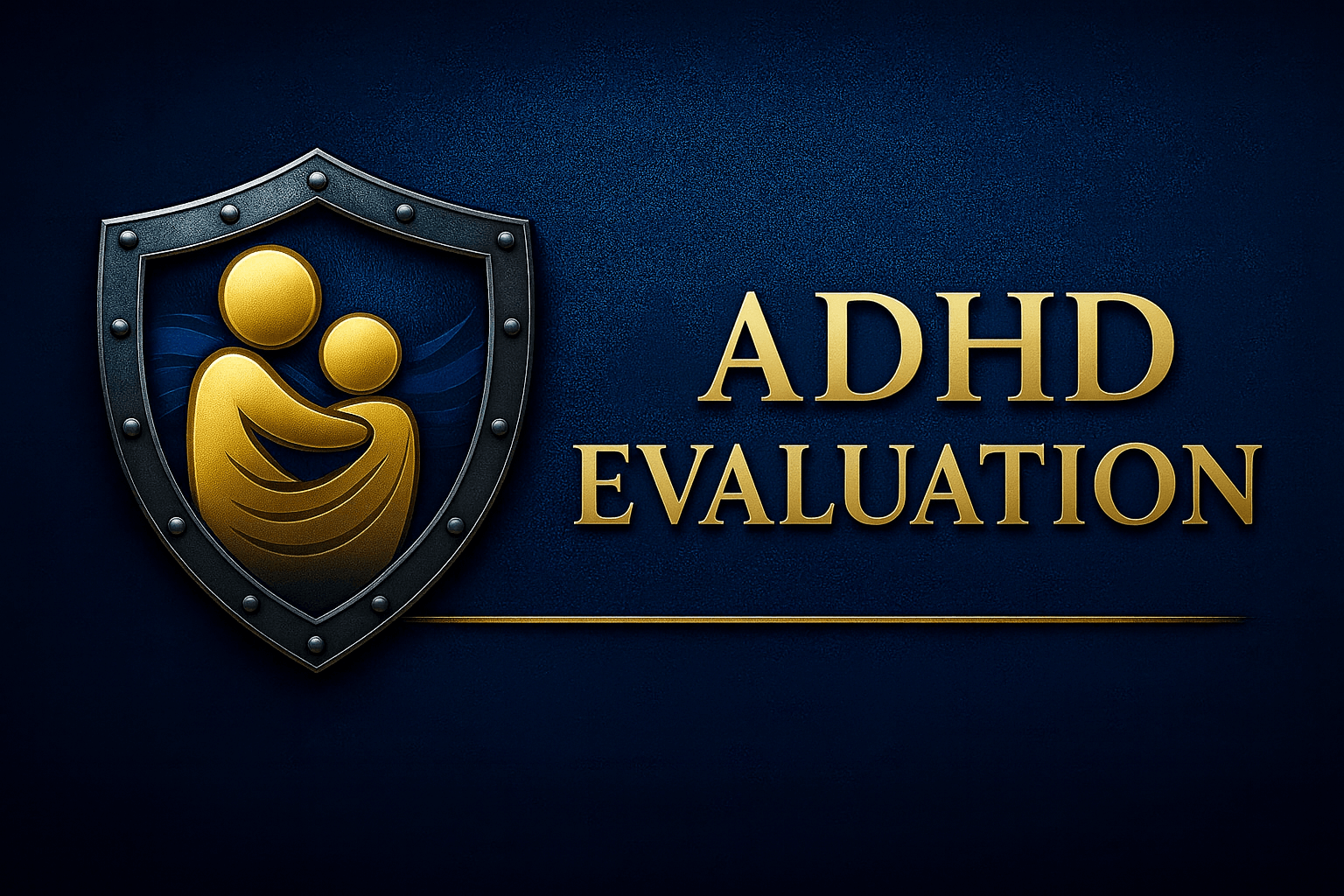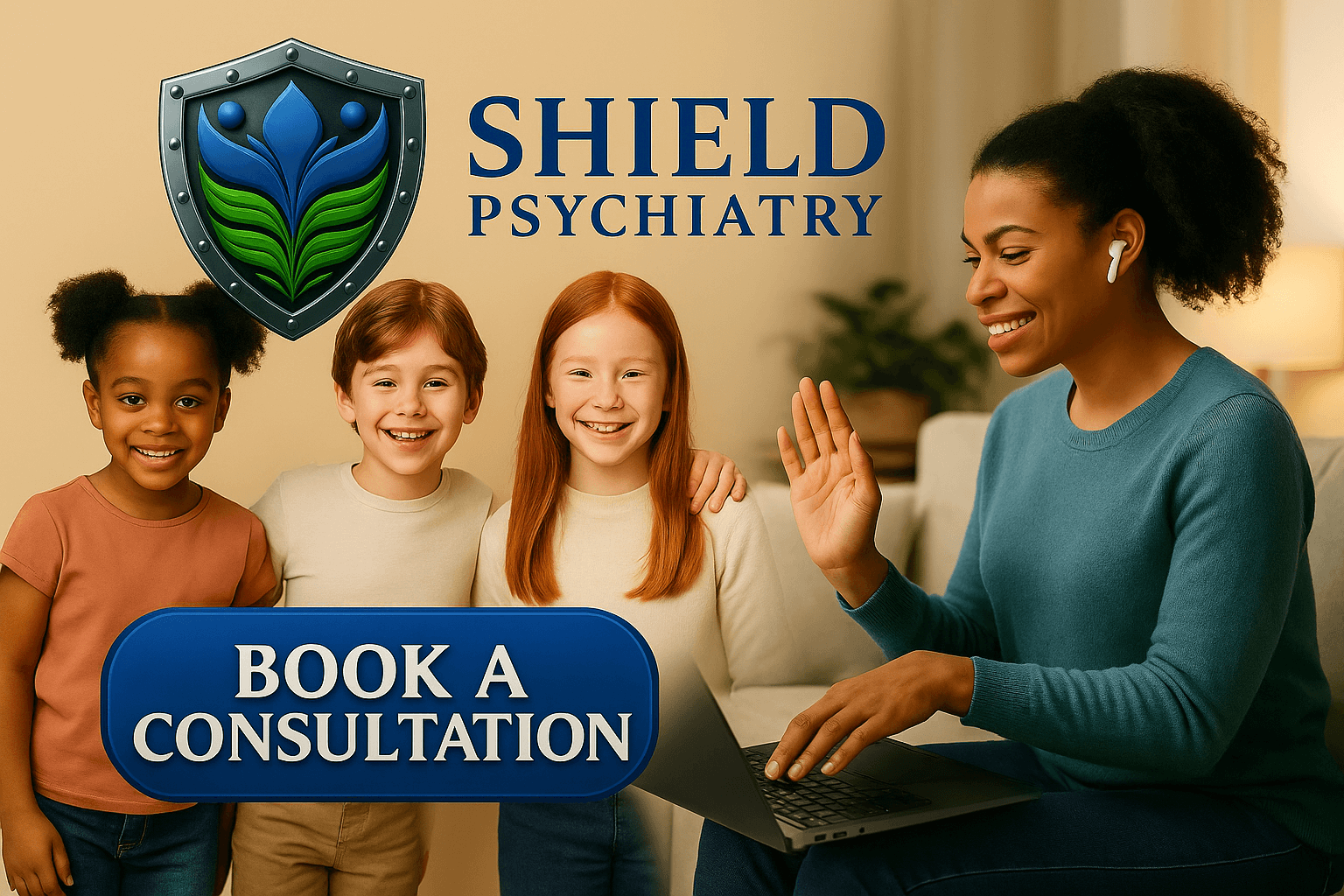
ADHD in Children, Teens & Young Adults
Objective evaluation, compassionate care, actionable plans
What is ADHD?
ADHD affects attention, impulse control, and activity level in ways that can impact school, home life, and self-esteem. At SHIELD Psychiatry, we pair a careful history with objective QbCheck™ testing (ages 6+) to clarify diagnosis and guide a plan that fits your child, teen, or young adult.
Common Signs by Age
- Ages 5–12: distractibility, big energy, trouble following multi-step directions, losing/forgetting items
- Ages 13–18: organization/time-management challenges, unfinished work, emotional reactivity, procrastination
- Ages 19–25: executive-function barriers for college/work, task initiation, sustained attention, time blindness
Our ADHD Evaluation & Care Approach
- Comprehensive intake: developmental, medical, and school history; rating scales across settings
- QbCheck™ testing (ages 6+): objective metrics for attention, activity, and impulsivity with motion tracking
- Diagnostic interview: DSM-5-TR formulation with differential and comorbidity review (anxiety, mood, sleep, learning)
- Strengths-based plan: home routines, school supports (IEP/504), skills training, therapy, and parent coaching
- Medication management (when indicated): shared decision-making, careful titration, and safety monitoring
Attention Constellation (At a Glance)
Simple, repeatable scaffolds (planners, checklists, timers) reduce overwhelm and build momentum.
Targeted accommodations (extended time, chunking, movement breaks) improve task completion.
Objective metrics help calibrate therapy and medication decisions over time.
Skills for frustration tolerance and cognitive flexibility support focus and follow-through.
FAQs
- Is ADHD just “bad behavior”? No. ADHD is a neurodevelopmental condition with biological underpinnings. Support changes outcomes.
- Do you always use medication? Not always. We start with skills and structure; medications are considered when benefits outweigh risks.
- Do you coordinate with schools? Yes. We provide letters and collaborate for appropriate IEP/504 accommodations.
- Do you test for ADHD? Yes—QbCheck™ (ages 6+) provides objective data alongside clinical evaluation.

-
ADHD is a neurodevelopmental condition that affects focus, impulse control, and hyperactivity. It can impact school, work, relationships, and daily life, but with the right strategies and treatment, individuals with ADHD can thrive.
-
ADHD symptoms vary by individual but generally fall into three categories:
✔ Inattention – Difficulty focusing, forgetfulness, trouble following instructions, and disorganization
✔ Hyperactivity – Excessive movement, restlessness, fidgeting, and difficulty staying seated
✔ Impulsivity – Acting without thinking, interrupting conversations, difficulty waiting for turns, and emotional outbursts -
ADHD is diagnosed through a comprehensive evaluation, including clinical interviews, symptom checklists, and behavioral assessments. At SHIELD Psychiatry, we provide telehealth-based ADHD evaluations to ensure an accurate diagnosis and personalized treatment plan.
-
Yes! While ADHD is often diagnosed in childhood, many adults continue to experience symptoms that impact their careers, relationships, and daily responsibilities. Common adult ADHD challenges include time management, organization, and impulse control, but targeted therapy and strategies can help.
-
✔ Medication Management – Stimulant and non-stimulant options to help improve focus and impulse control
✔ Behavioral Therapy – Cognitive Behavioral Therapy (CBT) and executive functioning coaching to develop skills for managing symptoms
✔ Parent Coaching – Support for families to create structured routines and positive reinforcement strategies for children with ADHD
✔ Lifestyle Modifications – Exercise, nutrition, sleep hygiene, and mindfulness practices to support ADHD management -
Yes! While medication can be highly effective, many individuals benefit from non-medication strategies such as behavioral therapy, structured routines, mindfulness, and executive functioning coaching. Our team at SHIELD Psychiatry tailors treatment plans to each individual’s needs.
-
✔ Establish a structured daily routine
✔ Use visual aids and planners to stay organized
✔ Break tasks into small, manageable steps
✔ Encourage movement breaks to improve focus
✔ Work with teachers on IEP or 504 accommodations
✔ Reinforce positive behaviors with praise and rewards -
You can schedule an ADHD evaluation or consultation by filling out our online form or contacting us directly. Our telehealth services make it convenient and accessible to receive expert ADHD care from the comfort of your home.
ADHD & Resources
Trusted ADHD & Mental Health Resources
Curated organizations, books, and apps families can rely on.
🔹 Trusted Mental Health Organizations
-
National Alliance on Mental Illness (NAMI)
Education, peer programs, and helpline for individuals and families.
-
American Psychological Association (APA)
Evidence-based articles, therapist locator, and clinical practice guidance.
-
Depression & Bipolar Support Alliance (DBSA)
Peer-led support groups, wellness tools, and education for mood disorders.
📚 Books on Depression & Recovery
-
Feeling Good: The New Mood Therapy — David D. Burns
CBT-based self-help with actionable thought records and exercises.
-
The Upward Spiral — Alex Korb
Neuroscience-informed micro-habits to nudge mood and motivation.
-
Lost Connections — Johann Hari
Contextual factors and social drivers; discussion starter for care plans.
📱 Top-Rated Mental Health Apps
-
Moodfit
Mood tracking, goals, and coping tools; build personalized routines.
-
Woebot
Daily CBT micro-coaching via conversational check-ins.
-
Happify
Evidence-informed activities targeting resilience and positive affect.
-
Calm
Meditation, sleep stories, and stress reduction modules.
ADHD Resources & Support
Evidence-informed tools for parents, teens, and clinicians.
🔹 Trusted Organizations
-
Children and Adults with ADHD (CHADD)
Evidence-based education, advocacy, and support groups for all ages.
-
Understood.org
Step-by-step guides for ADHD and learning differences; school supports.
-
ADDitude Magazine
Clinician-reviewed articles, webinars, and practical strategies.
📚 Recommended Books
-
Driven to Distraction — Edward Hallowell & John Ratey
Classic overview with clinical depth; hopeful, practical framing.
-
The ADHD Effect on Marriage — Melissa Orlov
Communication and systems for couples navigating ADHD patterns.
-
Smart but Scattered — Peg Dawson & Richard Guare
Executive function playbook with stepwise skills and checklists.

